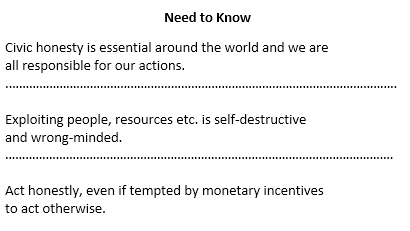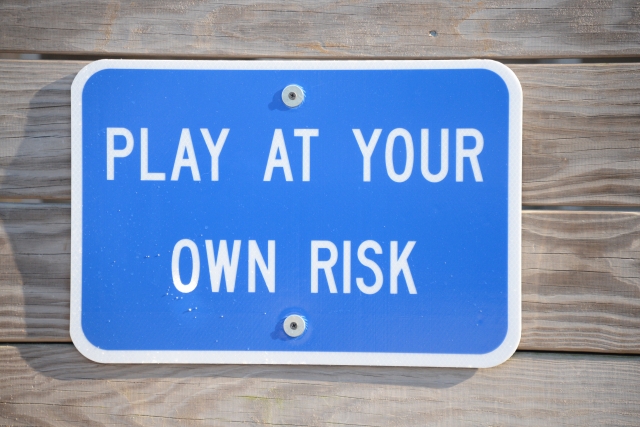Is There Any Explanation for the Way We Act? Part 2: Latest Insight from a Lost and Found Situation
November 19, 2019 ~ Written by: W.B. “Bud” Kirchner
Approx. Read Time: 12 Minutes
Civic Honesty
This article concludes our report on some recent research related to “civic honesty” and includes a recap of some of our earlier perspectives on ethics and values in business. As you know, this issue is extremely timely for so many reasons.
Human Nature
“All things come into being by conflict of opposites.” – Heraclitus
Thanks to a highly regarded neuroscientist, we went back to the drawing board on the article entitled Takers – A Result of the Imp of the Perverse – Part 1.
Gitendra Uswatte responded to the article as follows:
“I typically see eye to eye with you but have to disagree with your thesis in this piece that acting to exploit others is against human nature. My view is that most of us have a mix of impulses, both to benefit and harm others. And that the mix of beneficial to harmful impulses varies across individuals. That is not a flaw but a feature. Just like genetic variation produces a wide range of skin and eye colors, genetic variation produces a wide range of behavioral propensities. Different mixes suit different environments best, and even when a particular makeup is sub optimal for an environment, there is an advantage to the species in maintaining that makeup at some low-frequency in case the environment changes.”
“That is not to say that the traditional Western view that man is sinful by nature strikes the right balance or that we cannot shift the behavior of business leaders by changing corporate culture, laws, and regulations.”
Seems that this provides some explanation for what seems unexplainable?
“Without contraries is no progression.” – William Blake
Literary Perspective
(Takers – A Result of the Imp of the Perverse – Part 1)
“There is no passion in nature so demoniacally impatient, as that of him who, shuddering upon the edge of a precipice, thus meditates a Plunge.” ― Edgar Allan Poe, The Imp of The Perverse
Poe’s “The Imp of the Perverse,” is an essay about inappropriate impulses. “The impulse increases to a wish, the wish to a desire, the desire to an uncontrollable longing.” (#1)
The perversion here reflects a thought or action that goes against our natural instinct for survival and self-preservation. It is the act of self-sabotage that is equivalent to jumping off a cliff or letting go of the wheel while driving. Poe himself defined it as the defiance of all consequences or doing wrong for wrongs sake. He described the perverse as “a shadow that flits across the brain”.
What evidence exists to illustrate that the decision to be a “taker” is indeed perverse? If we accept the proposition that empathy is a fundamental human characteristic (Einfühlung) then is not a decision to “exploit or disadvantage others” clearly an imp of the perverse?
How absurd is the construct that we are building here? Well, while we would agree succumbing to the typical example of an imp, temptation to jump off a cliff is truly not in one’s best interest. Exploiting people, resources etc. is equally self-destructive or at the least wrong minded. One has repercussions directly to an individual – the other has consequences to the world around – it is, of course, a world for which we are all responsible.
In other words, the leap of logic that we are proposing here is that while the imp of the perverse is easily grasped in the context of the direct impact on yourself – similarly, the perversity can be extended to the impact on the world around you.
We end this section with what we would describe as an operational definition from Carey: “The visions seem to swirl up from the brain’s sewage system.” Could this explain the smell that is ‘taking’?
And just when it seemed clear?
As we reflect on the points above in the context of business, we can’t help but wonder how inherent (basic) is this temptation to exploit.
“What it lies in our power to do, it lies in our power not to do.” – Aristotle
Still Another Perspective
“There lives no man who at some period has not been tormented, for example, by an earnest desire to tantalize a listener by circumlocution.” ― Edgar Allan Poe
Finally, we come to the new research we alluded to at the start of what has become a review of perspectives.
Author Alan Cohn (#6) sets the stage: “Honesty is important for economic development and more generally, for how society functions in almost all relationships. Yet, it often is in conflict with individual self-interest.”
Experimental Design
Per the authors of Civic honesty around the globe:
“In this paper we examine how acts of civic honesty, where people voluntarily refrain from opportunistic behavior, are affected by monetary incentives to act otherwise. Although there is robust experimental literature on the conditions that give rise to honest behavior, little is known about how material incentives impact civic honesty, particularly in field settings. Understanding the relationship between civic honesty and material incentives is not only practically relevant, but also theoretically important.”
The salient points of this research are quoted in the following:
- “We conducted field experiments in 40 countries to examine whether people act more dishonestly when they have a greater economic incentive to do so, and found the opposite to be true.”
- “Civic honesty is essential to social capital and economic development, but is often in conflict with material self-interest. We examine the trade-off between honesty and self-interest.”
- “Citizens were more likely to return wallets that contained more money.”
- “Could it be explained by a combination of altruistic concerns and an aversion to viewing oneself as a thief, which increase with the material benefits of dishonesty.”
- “We typically targeted the five to eight largest cities in a country, with roughly 400 observations per country.”
- “Citizens were overwhelmingly more likely to report lost wallets with money than without.”
- “Over 98% of the money in the wallets we collected was returned.”
- “This suggests that recipients reported a lost wallet partly because recipients are concerned about the harm they impose on the owner.”
- “Larger monetary payoffs for dishonesty are also associated with increased psychological costs, and that the increase in psychological costs can outweigh the marginal economic benefits of dishonesty.”
- “Additional questioning suggests that respondents’ predictions reflected a mental model of human behavior that exaggerates the role of narrow self-interest.”
(Quick aside)
Co-corresponding author Michel André Maréchal of the University of Zurich summed it up thusly:
“The psychological forces — an aversion to not viewing oneself as a thief — can be stronger than the financial ones,”
As we read this summary, we couldn’t help but think of still another recent example:
- “NO ONE IS PROUD OF IT BUT THIS IS A CAPITALIST SOCIETY.” –
- So said Martin Shkreli ( I should’ve “raised prices higher” – Kate Gibson)
- Shkreli took a medication called Daraprim (initially developed to treat toxoplasmosis, which strikes people with compromised immune systems such as HIV, pregnant women and others with weakened immune systems) from $13.50 to $750 overnight.
In addition to the above – the following despicable quotes have been attributed to this guy:
- “In capitalism you try to get the highest price you can for a product.”
- “I regret not increasing the price of a life-saving drug by more than I already did.”
- “To go to 100 percent of the profit curve that we’re all taught in MBA class.”
- “But because the price increase has stuck, so to speak, I don’t really, that’s the main mission.”
Of course, he conceded that he put the drug company he ran at risk with his approach.
How Ironic Is This
“Waste no more time arguing about what a good man should be. Be one.” – Marcus Aurelius
In an effort to close on an ‘up’ (dare we say humorous) note but also to illustrate even more convincingly how enigmatic this issue is – it turns out not all wallets were returned – notable exceptions were:
- Wallets dropped off at the Vatican
- Two anticorruption bureaus
Bibliography
- Benedict Carey – Why the Imp in Your Brain Gets Out
- Alain Cohn, Michel André Maréchal, David Tannenbaum, Christian Lukas Zünd – Civic honesty around the globe
- Rana Foroohar – Makers and Takers – The Rise of Finance and the Fall of American Business
- Kate Gibson – Martin Shkreli: I should’ve “raised prices higher”
- Andrew W. Lo – Fear, Greed, and Crisis Management: A Neuroscientific Perspective
- Mariana Mazzucato – The Value of Everything: Making and Taking in the Global Economy
- University of Michigan – Moral concerns override desire to profit from finding a lost wallet
- Steven Pearlstein – Five myths about capitalism
- Ian Robertson – Bankers and the neuroscience of greed
Relevant Business Brain Model articles:
- Takers – A Result of the Imp of the Perverse – Part 1
- Makers & Takers: Why Can’t We Get This Right
- Two Steps Forward – One Step Back
- Human Nature as A Cause
- Takers” – Adding Another Perspective to the Discussion – A Result of the Imp of the Perverse? Part 1
- There Is A Special Place in Hell for Takers
- Is There Something Wrong with Our Wiring?
- Positioning Between the Poles: Is right really right and wrong really wrong?
- Financialization As A Symptom
- Our Wiring Isn’t Getting Any Better?!?!
- People Based Due Diligence
About the Author: W.B. “Bud” Kirchner is a serial entrepreneur and philanthropist with more than 50 years of business success. He is not a scientist or an academic but he does have a diversified exposure to neuroscience, psychology and related cognitive sciences. Generally speaking, the ideas he expresses here are business-angled expansions of other people’s ideas, so when possible, he will link to the original reference.


